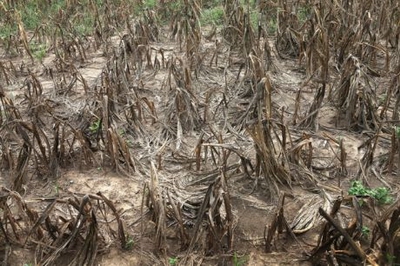
It wasn’t as visually dramatic as a superstorm making landfall in New York City or a wildfire tearing through the carcasses of water-starved trees, but hearing U.S. Secretary of Agriculture Tom Vilsack address the ways climate change will drastically impact farming in the not-to-distant future is pretty chilling, frankly.
“I’m not here today to give a scientific lecture on climate change. I’m here to tell you what we’re seeing on the ground,” he said in a speech hosted by the National Press Club yesterday.
What’s going on the ground are increasingly frequent severe weather events that destroy crops and forests. For farmers, there’s pressure to change and adapt to conditions that are far different than anything they’ve seen before.
“You’re going to see crops produced in one area no longer able to be produced,” Vilsack told the audience. “This problem is not going to go away on its own.”
In February, the USDA released its report on climate change and its expected impact on U.S. agriculture. The document included grim projections around regional temperature increases, carbon dioxide concentrations, and water availability—changes that will not only affect crop production, but animal production as well.
“If we do not adapt and mitigate climate impacts, it could have an impact on yields, it could have an impact on where we grow, [and] what we grow in the future. This is not something that is a next week issue or a next year issue, but this is something that over the next several decades we’re going to continue to confront,” he told reporters after the speech, according to the Des Moines Register.
To help farmers prepare for the challenges heading their way, the Secretary announced the USDA will launch seven regional climate hubs. These service centers will provide outreach and extension programs to farmers, ranchers and forest landowners, and will serve as a regional data source. The agency will also focus on carbon assessment and management of farmland; it will also provide new cover-cropping guidelines for growers.
But that alone may not be enough.
Fred Kirchenmann, distinguished fellow at the Leopold Center for Sustainable Agriculture, tells TakePart the conversation about agriculture and climate change must extend beyond the farm.
“The biggest challenge is going to be to monoculture farms. When you have a large amount of acreage in a single crop, you need climate favorable to that one crop. When you have diversity—drought may not be good for corn, but millet and sorghum can adapt,” he says. “The more diversity you have the better, and that calls for changing the food system. This conversation needs to extend beyond the farm and across the whole food system.”
It’s a critical point we hope Vilsack hears and embraces as part of this dialogue on making our agricultural system resilient to what’s ahead.





